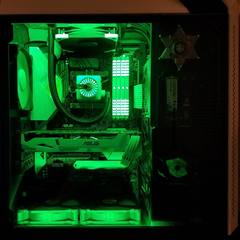-
Posts
16 -
Joined
-
Last visited
Awards
This user doesn't have any awards
About Shadow10499
- Birthday Oct 04, 1999
Contact Methods
-
Discord
Shadow10499 #3569
-
Steam
Shadow10499 (Mechromancer)
-
Origin
Shadow10499
-
PlayStation Network
Shadow10499
- Website URL
Profile Information
-
Gender
Male
-
Location
Iowa
System
-
CPU
Intel Core i5 13600K @ 5.3Ghz / 4.3Ghz
-
Motherboard
ASRock Z690M ITX
-
RAM
32GB Crucial Ballistix @3600MHz
-
GPU
MSI 3080 Ventus
-
Case
Loque Raw S1
-
Storage
Teamgroup 4TB Gen 3 NVME
WD Black 4TB HDD -
PSU
EVGA 850W GM (SFX) 80+ Gold
-
Display(s)
Acer Predator X34GS 3440x1440, 180Hz, IPS, HDR, G-Sync
AOC AGON AG271QG 2560x1440, 165Hz, IPS, G-Sync -
Cooling
ID Cooling IS60
Noctua NF-F12 iPPC 3000RPM PWM (x2) -
Keyboard
Keydous NJ80 with Gateron Milky Yellow, Brass plate and Poron foam.
-
Operating System
Windows 11 Pro
Recent Profile Visitors
Shadow10499's Achievements
-

Questions About My First NAS Build
Shadow10499 replied to Shadow10499's topic in Servers, NAS, and Home Lab
To be clear I'm talking about a barebones prebuilt nas. Not one that comes with drives. I'll buy those separate and save a ton. But it's right about 300 to 400 for a nas with just the 4 slots. Cheapest 4 slot with 2 extra M.2 slots for cache costs 580. Cheapest 6 slot with the 2 extra slots for sata SSDs is 600. It'll cost me extra in the NAS box itself. The SSDs will be about 100 for the both of them. Not too worried about that part. Just the fact I have to pay more for the NAS itself to utilize them. I can still build a DIY and then this matters very little. But I wanted to get a prebuilt solution ideally. -

Questions About My First NAS Build
Shadow10499 replied to Shadow10499's topic in Servers, NAS, and Home Lab
Getting a prebuilt nas with 2 extra slots for sata SSDs, or 2 extra slots for M.2 costs 200 to 300 more than a NAS that is just 4 slots with no room for any cache. It's not the drives that are expensive. It's the prebuilt nas unit that gets more expensive to accommodate the extra drives. Edit: buying a barebones NAS. Getting the drives separate. Drives will not be an issue. It's just the cost of the unit goes up to accommodate the extra drives. -

Questions About My First NAS Build
Shadow10499 replied to Shadow10499's topic in Servers, NAS, and Home Lab
I will have the NAS on a UPS, but can't afford high wattage UPS for all the computers so if a PC went out while copying I'm not sure if that would affect the NAS or not -

Questions About My First NAS Build
Shadow10499 replied to Shadow10499's topic in Servers, NAS, and Home Lab
Prebuilt is my preference as I'm just getting into this. I do care about data loss while writing as we have some absolutely massive files that will take a long time to copy. Writing is definitely most important, but I want to be able to read fast enough for 2-3 4K streams. If I don't go prebuilt it'll probably be TrueNAS but I'm looking at Synology or WD My Cloud for prebuilt as both can do Plex out of the box with just a switch. Edit: prebuilt is also gonna save me a little bit of money as any decent PC with decent networking and power supply will cost a bit more to begin with than a prebuilt. I'm on the fence either way but I do like the idea of a simple OS -

Questions About My First NAS Build
Shadow10499 replied to Shadow10499's topic in Servers, NAS, and Home Lab
Not exactly. Getting a prebuilt it's about 200 more to get one with M.2 for a cache, or a 6 bay with a SATA SSD cache. I would also want 2 in RAID for redundancy so I don't lose data if one dies while writing. The cost would probably be $100 for 2 Samsung 1TB NVME, and another $200-$300 for the enclosure price difference. Nas is gonna cost about $1100 with just hard drives so that's a solid 30% increase in cost. I don't know if it's worth it or not. I know hard drives are slower, but these are enterprise drives and in RAID 10 my understanding is I get the write speed of all 4 drives combined and the read speed of 2 of the drives combined. As well as redundancy on top. -

Questions about Switches, 2.5Gb Bandwidth, and My New NAS
Shadow10499 replied to Shadow10499's topic in Networking
That's actually really clever. I wouldn't have thought about doing it that way. I'll need to go custom on the NAS to be able to have a 10Gb card without paying an arm and a leg for a prebuilt. This also means in probably spending more on an NVME cache to come close to saturating 10Gb. Thanks for the recommendation though. I wasn't sure if $100 for a 2.5Gb switch was worth it when 10Gb were around that $200 range. I figured it didn't matter since the router only had 2.5Gb out, but I hadn't thought about separating the internet and data to the PCs like that. Very clever. Unfortunately my PC is an ITX so it won't get 10Gb, but at least it will get completely saturated. Sorry I'm a noob. I really do appreciate the responses -

Questions about Switches, 2.5Gb Bandwidth, and My New NAS
Shadow10499 replied to Shadow10499's topic in Networking
Thanks so much! -
I am currently about to order parts for my first NAS. The NAS is going to be four Seagate EXOS 14TB in RAID 10. Not sure if I need an SSD cache for it or not, as it will only have 2.5Gb of bandwidth max (my switch and router are 2.5Gb, as well as the PCs). Aside from randoms that should be close to saturated by my RAID 10 setup (I think). Please do correct me if I'm wrong about this. I was having trouble finding data on this topic, but I think this is correct based on the info I did find. Not sure if a SATA SSD cache or NVME cache is necessary, and if it would make any difference at all. This is all new to me. I have never had a NAS, only local storage of a 4TB SSD and 4TB HDD as a backup for my media. We just bought a house and went from 15Mb internet at my parents to 1Gb internet and 2.5Gb gear and we want a server for backups and to run Plex. It would be nice to be able to use it as a Steam cache down the line, but right now we have enough local storage on all devices to run our Steam libraries locally on our boot SSDs. The main priority for me is saturating the 2.5Gb connection for large writes to the NAS, and to be able to stream multiple (at least 2) 4K streams at once over Plex. I'm not sure if I need any sort of cache, or if a simple RAID 10 will be sufficient. I'm not sure if I need to go full custom and build a NAS from scratch, or if something like a "prebuilt" WD My Cloud or Synology NAS would be fine. Feel free to call me dumb, I just want to learn exactly how this works and it's hard to skim Google for stuff like this. There are a lot of basic beginner guides, and a lot of hardcore niche stuff, but I haven't found many articles about RAID 10 speeds with and without an SSD cache. Any help or reccomendations are appreciated. I realize some people may tell me this is probably over my head and I shouldn't be doing this since I don't know what I'm doing yet. We really do need a NAS for backups and as a media storage for Plex. I don't need it tomorrow, but very soon. Our media drive is 3/4 full and it's time to have a proper NAS instead of just sharing local storage across devices. I have to figure this all out one way or another. It would be nice to have some answers before I have to just order gear and figure it out through trial and error like with my first PC build. Thanks again!
-
I currently have a 2.5Gb router and modem. That is to say that one connection out on my router is 2.5Gb, and the other 3 are 1Gb. If I were to run from the 2.5Gb port on my router to a 2.5Gb switch, and from there connect my 3 PCs and NAS to said switch, would they all get the full 2.5Gb bandwidth to my NAS? (All ports on the switch are 2.5Gb) The NAS is going to be four Seagate EXOS 14TB in RAID 10. Not sure if I need an SSD cache for them yet, as they will only have 2.5Gb of bandwidth max and aside from randoms that should be close to saturated by my RAID 10 (I think). Please do correct me if I'm wrong about this. I was also having trouble finding data on this topic, but I think this is correct based on the info I did find. This is all new to me. I have never had enough bandwidth or internet speed for it to matter before. I have also never had a NAS, only local storage of a 4TB SSD and 4TB HDD as a backup for my media. We just bought a house and went from 15Mb internet at my parents to 1Gb and 2.5Gb gear. Feel free to call me dumb, I just want to learn exactly how this works and it's hard to Google stuff like this. There are a lot of basic beginner guides, and a lot of hardcore niche stuff, but I haven't found much about how exactly bandwidth is split. I really feel like all my questions are just so obvious that not many people have asked before. Maybe I'm just having trouble finding the needle in the haystack article amongst all the very basic guides. Any help / answers about how 2.5Gb bandwidth, or about whether I should have a cache for that RAID 10 is greatly appreciated. Thanks! P.S. I realize some people may tell me this is probably over my head and I shouldn't be doing this since I don't know what I'm doing yet. We really do need a NAS for backups and as a media storage for Plex. It doesn't need to be super fast like a Steam cache, but having that ability in the future would be nice. I kind of have to figure this all out one way or another. It would be nice to have some answers before I have to just order gear and figure it out through trial and error like with my first PC build. Thanks again!
-
Specs: Motherboard: Asus Prime Z390-A CPU: i5 9600K GPU: Asus GTX 1070 Dual OC RAM: 32GB Corsair Vengeance RGB DDR4 3200 (4*8GB) Power Supply: EVGA 650 GM, 80+ Gold SFX Cooling: DeepCool Captain 240EX AIO Storage: WD Blue 2TB M.2 SATA SSD OS: Windows 10 Pro 64bit, latest version, all new updates installed. Monitor: (Not sure if relevant, but..) Agon AG271QG - 27", 1440p, 165Hz, Gsync, IPS So, this is a weird one... Last night I was doing some light gaming, just playing Minecraft. I forgot to close the game and my computer fell asleep. Not a huge deal. This morning when I woke up the game had closed. Upon restarting it I was capped at 14FPS. Not above or below. Capped at 14 all the time. So I restarted and tried again. Same issue. I changed my display resolution and settings multiple times and nothing changed, still 14 FPS. I tried The Witcher 3 and for the first few seconds of the loading screen I was at 2000FPS and then I dropped to 30FPS (Normal for the startup) but then I tanked down to a locked 14 FPS. Naturally I was frustrated. I updated my graphics driver, though it was nearly the newest version AND I have never had any issues before. I reset my bios settings, turned off XMP, tried different games. Nothing worked. All I noticed was that other than an initial spike to 100% usage my GPU stayed under 10% while running games. I checked and confirmed that I wasn't running on integrated graphics. So at this point I assume I have a dead graphics card. This is where things get really weird. I took my GPU out of the case and ran on integrated graphics. (I had to install the latest display drivers) Running games on integrated graphics I am STILL getting 14 FPS locked. This is regardless of resolution or graphical settings, regardless of what game I am trying to play. As a last test I ran MemTest for 3 hours and had no fails. I think I have ruled out hardware failure, I dont think it has anything to do with the CPU. Usage never hit 100, so it isnt a CPU bottleneck. And usage for the CPU seems normal. So I am stuck with no ideas on how to fix this, I would like to avoid a new installation of Windows because its a pain to redownload everything. When I move my games to an external drive and then reset Windows my permissions are all messed up. Any help would be fantastic. I am open to any ideas.
-
Shadow10499 changed their profile photo
-

2133 MHz too slow for ryzen?
Shadow10499 replied to Cheeky Bugger's topic in CPUs, Motherboards, and Memory
I can't speak for FPS, but I know my Ryzen 2600 scored 1238 points running 2400Mhz in Cinebench. Then after enabling XMP and running at 3200Mhz I scored 1379. Both were at a modest 3.8Ghz with no voltage change. As far as real world performance? Beats me. -

dell optiplex mt gpu... this is gonna be fun
Shadow10499 replied to just that pc guy's topic in Graphics Cards
Switch the case and PSU. That's what I did with my MT 7010 back in the day. i7 3770 and 12GB of DDR3. Added in a GTX 1070 when I switched my case. You'll need to know how to rewire the front panel headers because of Dell's stupid proprietary ones (I could help if needed). For less than $400USD you can have a kick ass 1080p gaming machine. Even 1440p if you have a new-ish Core i7 and a good GPU. -
.
- 1 reply
-
- troubleshooting
- not booting
-
(and 1 more)
Tagged with:
-
.
- 1 reply
-
- troubleshooting
- not booting
-
(and 1 more)
Tagged with:





